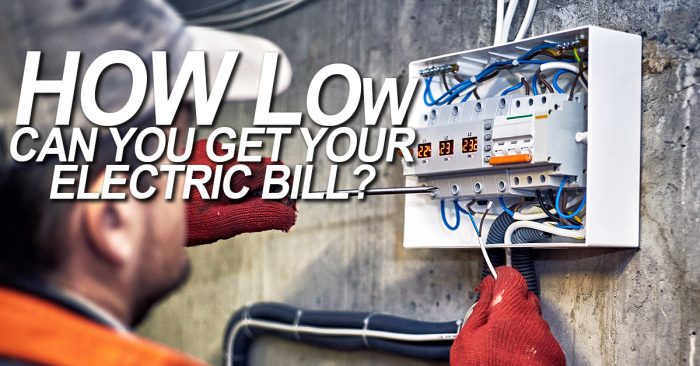
How Low Can You Get Your Electric Bill?
Unless you totally disconnect and get off the grid, odds are you will never achieve a zero electric bill. After all, there are minimum charges, taxes and fees you will get billed for even if your electric meter doesn’t make a turn. But how low can you get your electric bill and where should you spend your efforts? Here are some thoughts.
Your HVAC
Your “big users” are the appliances that use the majority of the electricity in your home (over 10%) and are worth paying particular attention to. The biggest, of course, would be if you heat or cool with electric heating and air conditioning. There are several ways to reduce HVAC electric costs, including making sure your system is relatively modern and efficient. You can also adjust your thermostat accordingly and either close or open windows and blinds to adjust to seasonal changes.
Water Heater
Your water heater may be using up to 15% of your total electricity. If you have a full size water heater but a small family, consider downsizing your tank or using an on-demand system. There are also solar water heater systems that will heat your water without electricity.
Washer and Dryer
Only operate washers and dryers with full loads to maximize power use. Try drying lighter weight items on a clothes line or rack. Don’t dry clothes on a higher setting than necessary. It is estimated washers and dryers account for about 13% of the average electric bill.
Lighting
Many of us lose focus on how much lighting contributes to our electric use. In fact, at 12%, lighting is just behind washers and dryers in contributing to our electric bill. Replace bulbs with more energy efficient or LED bulbs and turn off the lights in rooms that are not in use.
Refrigerators and Ovens
Using about 4% each, refrigerators and electric stoves can contribute up to 8% of energy use between them. While there’s not much you can do to reduce use of these items, you may want to pay attention if you have an extra refrigerator in the garage or basement. An old refrigerator may end up costing you more than it is worth. If you need extra refrigerator space, consider an energy-efficient apartment size unit as opposed to repurposing an old refrigerators.
Of course, the rest of your electric bill will be a combination of power used for computers, cable boxes, TVs, radios and small appliances. The best you can do is keep charging cords unplugged when not in use and computers off when idle.
What could you do with an extra $20-$50 per month? Consider going on an electric diet and see how low you can go.









